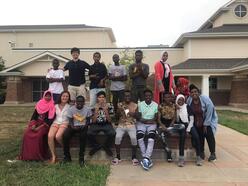Part two in a three-part series, these deep dives better explain the process of refugee resettlement in Kansas. In December, we covered the basics of who refugees are and initial resettlement in the U.S. This month, the focus is on refugee resettlement in Kansas during the first 24 months after arrival, including the efforts of the International Rescue Committee (IRC) in Kansas to help families positively integrate and thrive in their new community.
The days following arrival in Kansas are filled with activity and culture shock for newly arrived refugee families and individuals. As they become familiar with their new surroundings, the IRC is there to ensure questions are answered, needs are met, and families soon focus on reaching self-sufficiency. Through a network of staff and volunteers, the IRC helps refugees learn about life and customs in the U.S., enroll in English classes, make sure kids are going to school, schedule health appointments, secure jobs and much more. The IRC provides an array of programs and services to help refugees rebuild their lives in the Sunflower State, overcome cultural barriers, and adjust to their new lives.
Within one month of arrival, refugees attend an eight-part cultural orientation at the IRC office. During these sessions newly arrived refugees learn about IRC programs and services available to them as well as important information regarding the community they now call home. During one session, a police officer from the Wichita Police Department leads a discussion on public safety and emergency services, and demonstrates that not everyone in uniform is scary.

In addition to orientations, the family’s caseworker at the IRC is responsible for enrolling them in services and programs provided by the IRC and the broader community. This includes attending medical appointments, enrolling children in school and applying for medical insurance. The circumstances under which refugees leave their country are different from those of other immigrants. Often when fleeing violence and persecution, refugee families are left without the luxury of personal possessions or preparing themselves for life in a new culture. Recognizing this fact, the federal government provides transitional resettlement assistance to newly arrived refugees, including access to a refugee resettlement service provider like the IRC. During the first 90 days after arrival, agencies such as the IRC contract with the Department of State to provide for a portion of a refugee family’s food, housing, transportation and other integration services to help the family make a rapid transition to economic self-sufficiency.
Refugees are encouraged to find work quickly and stand on their own feet — and more than 92% do within the first six months of receiving services in Kansas. To help refugees find a job soon after arrival and to start on the path towards self-sufficiency, the employment team at the IRC offers a variety of pre-employment services. The IRC employment team covers important job search skills including resume building, interviewing, and English workplace vocabulary, as well as assistance in applying for jobs and developing the English skills needed.

Resettlement agencies typically are only able to provide core resettlement services, like case management or employment assistance, for the first three to six months after arrival. The IRC in Kansas is able to provide employment services for up to five years after arrival, ensuring that when clients are ready to move up or gain new skills, the IRC is here to help. We know that transitions such as moving to a new country do not happen overnight and we want to give refugees the opportunity to return to the IRC when they begin planning the next steps in their life.
Be sure to subscribe to our newsletter to read next month’s update outlining what refugee resettlement looks like after the first two years of resettlement.
Learn more about refugee resettlement in the U.S. here. Visit Rescue.org/Wichita to learn how you can support newly arrived refugees in our community.